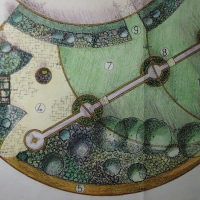 Summer fruiting raspberries are just about coming to the end here at Old School Garden, but Lee Mason of Whetstone has had a disappointing harvest:
Summer fruiting raspberries are just about coming to the end here at Old School Garden, but Lee Mason of Whetstone has had a disappointing harvest:
‘I planted some ‘Malling Promise’ raspberry canes back in February. They’ve grown pretty well, but the harvest has been disappointing and the new growth looks to be weak. Would a fertiliser feed help?’
Malling Promise canes (and any other summer fruiting raspberries for that matter), planted in February would have benefitted from cutting down in their first season to 100 mm (4 inches) high canes back in March to encourage strong new root development, as well as new canes for fruiting in the following season. In short, Lee, you’ve ‘got a bit ahead of yourself’! I suggest that you cut down all growth next March. You will lose a season’s cropping, but the sacrifice will be worth it in the long run. Giving the canes a good mulch of organic matter or a general fertiliser like fish, blood and bone should also help, if applied next spring.
Raspberry flavour
Have you been disappointed with the flavour of your raspberries? Sulphate of potash is a good fertiliser to use to enhance raspberry flavour, but only if the raspberry variety you grow has some natural flavour of it’s own. Varieties like Malling Admiral have little natural flavour, whereas Malling Jewel or Malling Promise are better.
Shrivelled fruit
Are your raspberries shrivelled up? This might be because you’ve been a little too enthusiastic in digging around the canes! Avoid digging over the ground near the roots, as raspberries are surface rooters and don’t like any cultivation anywhere near the canes. This breaks the roots- which can spread out quite a way- and as a result the plants will be unable to cope with the extra stress at fruiting time. If you restrict your cultivation to the use of a Dutch hoe and follow this up with a good deep mulch of organic matter in the spring this will do wonders for the quality of your fruit.

- Cut down the canes of autumn fruiting raspberries in early March
Pruning Autumn (and Summer) raspberries
The first autumn raspberries are starting to appear here at Old School Garden (earlier than normal probably due to the mild winter and spring). It looks like we’ll have a good harvest. With these, the fruit comes on canes produced in the current season, so after fruiting (which can last into October) the old canes need to be cut back, but when is the best time to do this? Well not immediately after harvesting, apart from damaged or broken canes. It’s best to leave the rest until the following spring (early March), when all the remaining canes can be cut down almost to ground level. This ensures that some protection for the newly emerging canes is provided over winter. In July weak growth can be removed so that only the strongest canes are left for fruiting.
With summer fruiting varieties it’s best to cut down the canes that have fruited immediately after harvesting has finished and to select the strongest new canes and tie these into wire supports to protect them over winter. In spring the tops can be cut back by about 6 inches or alternatively these can be looped over and tied into the top wires.
Old School Gardener
If you’ve enjoyed reading this post and others on this blog, why not comment and join others by signing up for automatic updates via email (see side bar, above right ) or through an RSS feed (see top of page)?







Sorry about all the typos in my original reply! 😦
Reblogged this on Edinburgh Garden Diary and commented:
We have raspberry canes in our communal back green. They were planted by a neighbour who then sold up and left, leaving the rest of us to enjoy, literally, the fruits of her labour. Therefore I was so interested to read Nigel Boldero’s instructions on getting the best out of raspberry canes year on year. I’d been under the impression that you could just leave them to do their own thing, and I stand happily corrected.
Thank you for these tips. A neighbour planted raspberry canes in our communal back green, then promptly moved abroad leaving the rest of us to enjoy her handy work! It’s good to know what to do with the raspberries to ensure a good crop next year.
After moving to Scotland I was enchanted to find out that here raspberries grow wild all over the place – not just in the countryside, but within Edinburgh city, alongside cycle paths and that sort of thing.
Hi Joanna
Thanks for the comment- glad the post is if some help. You’re lucky to have a free crop of raspberries, but as you appreciate you’ll have to do some work to ensure future harvests! I founda few gasp in my rows of summer raspeberries a couple of years ago and panted a diferetn, later fruting one than the main crop- after two years establishing these are now coming into fruit and they are a fatter, juicer berry than the main crop. So with the autumn ones we shpuld have raspberries right through to October 🙂
That was a good idea! Rasberries all summer and through to October sounds wonderful. I will reblog this if I may on my own blog at edinburghgardendiary.wordpress.com and that way I will have a good chance of remembering what to do when it comes to cutting back the canes later on!
Thanks, no problem with the RB 🙂